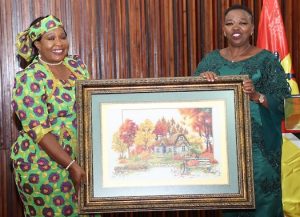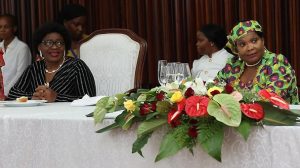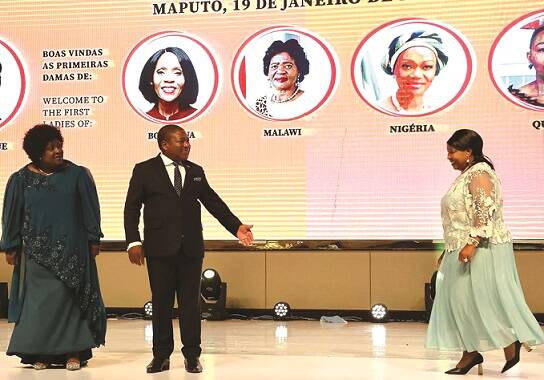Mozambican President Phillipe Nyusi ushers First Lady Dr Auxillia Mnangagwa to the stage while First Lady Dr Isaura Nyusi looks on during the launch of “We are Equal” campaign and “Zero Waste Movement” in Maputo, Mozambique, on Friday
By Tendai Rupapa in MAPUTO, Mozambique
The coming together of African First Ladies to deliberate on gender equality and environmental preservation is an essential element to promoting unity and economic progress on the continent, Mozambican President Filipe Nyusi has said.
He made the remarks in his keynote address at the launch of the “We are Equal” campaign, a continental initiative by African First Ladies and First Lady Dr Isaura Nyusi’s “Zero Waste Movement”.
The launch brought together First Ladies from Zimbabwe, Kenya, Nigeria, Malawi and Botswana. Queen of Eswatini and Rwandan First Lady sent high-level representatives.
First Lady Dr Auxillia Mnangagwa, who is already a signatory to the “Zero Waste Movement”, outlined strides that she has made towards the sustainable management of Zimbabwe’s environment.
Amai Mnangagwa signed the “Zero Waste” declaration and launched the “We Are Equal” campaigns last year.
In her remarks, Dr Mnangagwa spoke about the country’s first-of-its-kind colour-coded underground waste disposal and separation facilities and the Geo Pomona waste-to-electricity project, which drew interest from other First Ladies who were keen to learn more from her.
President Nyusi expressed delight at the presence of the First Ladies, who he said were guided by a converging agenda of inclusive and sustainable development and focused on gender equity and environmental preservation.
“The First Ladies, for their outstanding social role and position, play their part as important and frontline agents of behavioural transformation in building more just, inclusive and harmonious societies on our continent. Your Excellencies, the Organisation of African First Ladies for Development (OAFLAD), has been positioning itself as an important cooperation platform among African countries,” he said.
Through OAFLAD, President Nyusi said, African First Ladies have played an increasingly active and visible role in promoting social causes, particularly for the most vulnerable groups in the framework of child, maternal health, prevention and combating of HIV and AIDS, protection of children, girls and the elderly, promotion of women empowerment and gender equity mainstreaming, and environmental preservation, among others.
“Under the motto that unity is strength, the actions of OAFLAD increasingly demonstrate the true sense of the African wisdom that ‘if you want to move quickly, go alone, but if you want to go far, go accompanied’. Above all, the presence of Your Excellencies, First Ladies and representatives of the First Ladies is indeed an act of celebration of Pan African ideals advocated by the founding fathers of our post-colonial states.
“In this regard, OAFLAD campaign ‘We are Equal’, whose launch we witness here today, materialises the essential truth enshrined in the noble principle of the Universal Charter of Human Rights of equality between men and women,” he said.
This initiative, President Nyusi observed, shows that the First Ladies have been taking up, with responsibility, the challenge of ensuring that in their countries, the realisation of the principle that all persons are born equal and enjoy equal rights regardless of differences based on sex, race, ethnicity, physical and social status.
Gender equity and mainstreaming and the elimination of gender disparities in all sectors, the Mozambican leader said, also constitute one of the commitments assumed by African leaders within the scope of the African Union Agenda 2063 and the fifth goal of the United Nations Agenda 2030 on Sustainable Development.
President Nyusi spoke on waste management, which he said was not a trivial matter.
“Waste impacts the life of people in both urban and rural environment, but it also contributes to ecosystems degradation, particularly in aquatic environments, both marine and river,” he said.
“The zero waste approach goes beyond solid waste management. Zero waste implies a society adopting sustainable production and consumption practices to maintain a lifestyle that is in harmony with nature and remove from it only those resources that people don’t need and that nature can restore,” he said.
First Lady Dr Auxillia Mnangagwa shared with the conference the various initiatives she is undertaking to promote good waste management in Zimbabwe and enjoined guests to play their roles in fostering cleanliness.
“I wish to express my sincere gratitude for the invitation extended to me for this wonderful and equally important event. Ladies and gentlemen, we agree that over the years, the volume of waste that has been generated has exponentially increased as urbanisation and industrialisation inevitably accelerates on our continent,” she said.
She added: “In response to this contemporary challenge, Zimbabwe has developed various plans and strategies as the Government moves to ensure the country has sustainable environmental management and waste disposal systems.
“Further and to inculcate the culture of cleanliness, His Excellency the President of the Republic of Zimbabwe Dr ED Mnangagwa declared the first Friday of each calendar month a national clean-up day.
“Through this important intervention, we have seen remarkable results as the programme has become entrenched into our culture. Our national stakeholders, including corporates, have incorporated the day into their annual work calendars in support of Government efforts on waste management.”
Dr Mnangagwa spoke about her involvement in recycling.
“I launched, through my office, the First Lady’s recycling programme, which helps marginalised and underprivileged women and youth receive training on recycling as a business and this has encouraged people to benefit from the empowerment project and clean environments.
“The Zimbabwe Government is championing the involvement of the private sector in economic development of the country as espoused in Zimbabwe’s development blueprint, the National Development Strategy 1.
“Waste management is an area that we have seen the private sector taking a keen interest. A successful example is the recently commissioned Geo Pomona waste-to-energy project in Harare, a first-of-its-kind in Zimbabwe that is expected to enhance the cleanliness of the city while providing electricity to the national grid,” she noted.
She also urged young people to participate in waste management and recycling.
“In the same vein, there is need to get our young people involved in waste management and recycling as means of creating the much-needed employment as well as assisting local authorities in their endeavours. Your Excellences, ladies and gentlemen, the significance of zero waste tolerance is premised on advocacy for improved waste management systems that encourage responsible waste disposal and recycling.
“We, therefore, advocate for law reforms in local governance to ensure transparency and accountability for improved service delivery,” added Dr Mnangagwa.
She called for collaborations between governments, local authorities, private sector and citizens to raise awareness around solid waste management and good environmental stewardship.
“Indeed, for zero waste tolerance to be a resounding success, it requires everyone to play their part, from governments to local authorities, private sector and citizens.
“This campaign, therefore, provides an opportunity for governments and local authorities in particular to partner non-State actors to raise awareness around solid waste management and good environmental stewardship among citizens, especially given the growing populations in our cities and towns.

First Lady Dr Auxillia Mnangagwa exchanges gifts with her Kenyan Counterpart, Dr Isaura Nyusi, at the Presidential Palace in Maputo, Mozambique, on Friday
“I am alive to the fact that awareness campaigns are key and go a long way in sensitising communities on environmental stewardship, which in turn foster the conservation and promotes sustainable environments.
“On their part, civil society organisations are encouraged also to use this opportunity to lead the advocacy and partnerships around this important subject matter. Above all, cleanliness should be implemented from the grassroots level, from families in the homes. Our sub consciousness should always be aligned to anti-littering and cleanliness. As a result, I have launched cleanliness and hygiene awareness programmes aimed at informing the general public on the dangers of litter at undesignated areas,” she said.
Health and sanitation, Dr Mnangagwa added, was imperative for development.
“In support of Government efforts to promote the reuse and recycling of litter, I commissioned the first of its kind colour-coded waste disposal facility, which categorises and separates waste. The waste is then stored below the ground with lower and more stable temperature.
“I also signed in my capacity as the First Lady of Zimbabwe the Global Waste Management Declaration on the sidelines of the 78th United Nations General Assembly meeting in New York. Today, we are also here in Mozambique to witness the spread of this significant pledge. I, therefore, call upon all of us to be part of a new and exciting future that is waste free and that provides a clean environment for our communities indeed this is possible and together we can achieve more for ourselves,” she said.
Host First Lady, Dr Nyusi welcomed her guests to the important occasion.
“Once more, welcome to Mozambique, especially to this conference all you my sisters First Ladies. It is a great honour and pleasure that I greet you all at this international conference on gender equality in Africa. In this meeting we address the issues of gender equality in Africa through sharing experiences, practices and challenges among countries here present. Although the countries here represented including Mozambique have registered advancements in gender parity we still have many challenges that need collective attention for a prosperous Africa. The campaign ‘We Are Equal’ is a continental initiative promoted by OAFLAD, which I and my sisters here present are part of.
“The support of the African Union has four pillars namely health, education, gender-based violence and the economic empowerment of women and girls. The main objective of this campaign is to transmit the truth that we are equal and we have always been. It’s an agenda to accelerate immediate actions to promote equality and eliminate gender differences in Africa and the achievement of sustainable development goals,” she said.
In the fight for an equal world for all, Dr Nyusi said, the influence of climate change could not be ignored.
“Environmental degradation has a great impact on gender equality because there is evidence that shows that there are more women involved in waste management than men. I am not discriminating. Generally, these women work free of charge, they do not earn anything and they get more exposed to health risks. These women are involved in many informal tasks. They collect waste in garbage dumps unlike men who have more opportunities to earn than this way,” she said.
Nigerian First Lady Senator Oluremi Tinubu described her invitation to the summit as an honour.
“It is an honour to be here at this momentous occasion that transcends borders and inspires change in Africa. I thank my dear sister, Dr Nyusi, for extending an invitation to me to witness the signing of the Zero Waste Movement and the launch of the We Are Equal campaign in your beautiful country. I commend your work and commitment in the realm of health, combating gender-based violence, fostering education, enabling economic empowerment and environmental well-being.
“Nigeria is a federal, multi-cultural and multi-religious country as well as the most populous country in Africa. We recognise that education is the cornerstone for national development and we are resolute in ensuring that every girl has an equal opportunity to quality education. In the area of the environment we recognise the global urgency of addressing climate change,” she said.
Nigeria, Senator Tinubu said, has embraced clean policy initiatives aligned with international regulations to address solid waste management.
Kenyan First Lady Rachel Ruto described the conference as essential in reshaping the narrative of the African continent.
 First Lady Dr Auxillia Mnangagwa and her Malawian counterpart, Mrs Monica Chakwera, follow proceedings during a dinner hosted by their Mozambican counterpart, Dr Isaura Nyusi, at the Presidential Palace in Maputo Mozambique, on Friday. – Pictures John Manzongo
First Lady Dr Auxillia Mnangagwa and her Malawian counterpart, Mrs Monica Chakwera, follow proceedings during a dinner hosted by their Mozambican counterpart, Dr Isaura Nyusi, at the Presidential Palace in Maputo Mozambique, on Friday. – Pictures John Manzongo“OAFLAD’s ‘We Are Equal’ campaign addressed four critical thematic areas – healthcare, gender-based violence, education and economic empowerment. These areas touch on the women of our beautiful continent and resolving the challenges that affect these sectors. It is of much benefit to our women and girls. I am honoured to join my sister Dr Nyusi in launching ‘We Are Equal’ campaign and Zero Waste Movement initiatives that touch on education and retention of girls in school, empowerment and waste management. In Kenya, we launched the ‘We Are Equal’ campaign on November 25, last year. Ladies and gentlemen, Africa is grappling with solid waste related challenges compounded by ongoing rapid urbanisation,” she said.
Malawi First Lady Monica Chakwera said the campaign was critical in addressing issues of equality.
“This campaign aims to convey to us issues of equality hence the hashtag ‘We Are Equal’ calls for urgent action to mainstream gender equity and address gender inequalities in Africa,” she said.
Botswana First Lady Neo Jane Masisi said she was grateful to work with other First Ladies for the betterment of her nation and Africa at large.
“Through OAFLAD, we are further accorded the platforms as mothers of our respective nations to leverage our unique positions to advocate for policies as a collective to support women and youth. This gives us an opportunity and places us at the face of pressing issues in our countries so that we can make valuable contributions. In this instance here we are under the ‘We Are Equal’ campaign, making contributions and making efforts to close the gender equality gap on our continent,” she said.
The participation of women and girls, she said, was a critical for accelerating development on the continent.
Eswatini representative, Princess Lindiwe who is the Minister of Internal Administration said: “Sustainable development goals represent an urgent call to action by all countries, including in education and environmental management. This underlines the significance of today’s deliberations and outcomes therein. Indeed, this conference can help to chart a positive collective destiny of our people. Parity in the access of education is a core principle of the education policy of the Kingdom of Eswatini. His majesty’s government is committed to ensuring that both boys and girls access education without gender discrimination in line with the education sector’s strategic plan 2022-2034. The national gender policy of 2023 mainstreams gender in development plans including education and training of all government ministries have gender focal points to ensure mainstreaming of gender issues,” she said.
Dr Valentine Uwamariya, Rwanda’s Minister of Gender and Family Promotion who was representing First Lady Jeaneate Kagame spoke about the interconnection between equality and the need to eliminate waste responsibly.
“Both issues being launched here are interconnected as they both require our collective efforts to be addressed and women are the most affected when we don’t achieve our targets. In this occasion, it is very crucial to recognise the collaborative efforts of the First Ladies with OAFLAD for working tirelessly to support interventions at the African level by sharing best practices and exchanging knowledge. Your collective dedication to improving the lives of Africans is truly remarkable.
“Education, health, gender equality and women empowerment are pillars that shape the progress and prosperity of any nation. Women carry the heavy burden when environmental crises strike and one of the right ways to fight back is through zero waste commitment which is a mindset that encourages us to reduce, reuse and recycle thereby minimising the impact on the environment. Your excellences ladies and gentlemen, by prioritising health, addressing gender based violence, promoting education and economic empowerment for women and adopting a zero waste mindset, we can create a world where everyone is treated equally and our planet thrives in harmony,” she said.
Speaking at the same occasion, Mrs Catherine Sozi, UN resident coordinator for Mozambique spoke glowingly about the unity of First Ladies across the continent.
“We provide new momentum to the elimination of the gender gap in Africa. It is only with strong cooperation that we can move on as a society and it is only with strong cooperation that we can achieve gender equality and drive social and economic progress for all to build the world that we want, the Africa that we want. The work done by the movement of African First Ladies is exemplary of what we can achieve if we work together. As said by the UN Secretary-General António Guterres, we must declare war on waste. It is time to clean up our world and we must make progress towards zero waste economies for people and climate alike and for that to become a reality, everyone has a role to play,” she said.
Dr Nyusi later hosted a dinner for her guests to mark the end of the programme.
source: sundaymail.co.zw
newsroom@zimbawavemedia.co.uk




